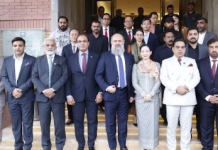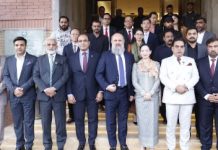Anjum Nisar for taking measures to avoid further damage to fragile industrial landscape
ISLAMABAD, OCT 12 /DNA/ – The Federation of Pakistan Chambers of Commerce and Industry’s (FPCCI) Businessmen Panel (BMP) has strongly criticized the government over the recent imposition of inflated gas bills on the industrial sector, describing the practice as “unjust, unsustainable, and detrimental to Pakistan’s economic growth.” Speaking on behalf of the business community.
Businessmen Panel chairman and FPCCI former president Mian Anjum Nisar urged the authorities to take immediate corrective measures to avoid further damage to the already fragile industrial landscape.
Addressing the media, Mian Anjum Nisar highlighted the growing distress among industrialists caused by the erroneous application of peak-hour gas tariffs instead of the agreed off-peak rates. He emphasized that the industrial sector, which is a cornerstone of Pakistan’s economy and employment, is being severely impacted by these inflated charges at a time when it can least afford such financial burdens.
“The gas bills being sent to industries are calculated at peak-hour rates, which are nearly double or even two and a half times higher than the off-peak tariff that should have been applied,” said Mian Anjum Nisar. “This is not only unfair but also violates the principles of equitable and cost-reflective pricing that are essential to fostering industrial growth and sustainability.”
Mian Anjum Nisar recalled that the Businessmen Panel has repeatedly raised this issue with the government over the past months, urging for the implementation of a uniform 24-hour tariff system. “We have consistently warned that the arbitrary application of peak-hour charges would cripple the industrial sector, leading to factory closures, massive job losses, and a decline in Pakistan’s export competitiveness. Unfortunately, our warnings have not been adequately addressed.”
He further pointed out that this unjust billing practice is being justified by some government circles as a condition of the International Monetary Fund (IMF) programme. “We categorically reject this justification. The IMF has called for fiscal discipline and reforms but has never mandated the indiscriminate application of peak-hour tariffs that punish industrial consumers. It is the responsibility of the government to design policies that balance fiscal needs with the sustainability of the industrial base.”
Highlighting the broader impact, Mian Anjum Nisar explained that inflated energy costs are pushing production costs to unsustainable levels. Industries, particularly export-oriented sectors such as textiles, chemicals, and manufacturing, are facing severe price pressures. This is making Pakistani goods less competitive in the global market, threatening foreign exchange earnings and economic stability.
The FPCCI’s BMP Chairman stressed the need for urgent government intervention to prevent the worsening of this crisis. He called upon the federal government, energy regulators, and all relevant stakeholders to immediately review the gas billing methodology and revert to the off-peak tariff structure for industrial consumers.
In addition to immediate relief on gas billing, Mian Anjum Nisar proposed that the government adopt a uniform 24-hour gas tariff to avoid confusion and ensure fairness for industrial consumers. He urged that transparent billing and strict regulatory oversight be put in place to monitor accuracy and swiftly address discrepancies. Given the critical role of export industries in the country’s economy, he recommended the introduction of special energy pricing schemes or subsidies for sectors that contribute significantly to foreign exchange earnings.
Furthermore, Mian Anjum Nisar encouraged the government to incentivize industries to adopt energy-efficient technologies and explore renewable energy sources to reduce dependence on expensive fossil fuels. Continuous dialogue between the government, industry representatives, and regulators was also highlighted as essential to craft pragmatic and equitable policies conducive to economic growth.
Mian Anjum Nisar emphasized the socio-economic implications of inflated industrial energy costs, noting that thousands of workers depend on these industries for their livelihoods. When factories close or reduce production due to soaring costs, it directly translates into job losses and increased poverty. The government must realize that protecting industry is synonymous with protecting the welfare of millions of Pakistanis.
Reflecting on past initiatives, Mian Anjum Nisar noted that the FPCCI BMP has been at the forefront of advocating for an investor-friendly environment and pragmatic energy policies. The panel has consistently worked to highlight the challenges faced by businesses and propose actionable solutions. It is disappointing that these recommendations have not yet yielded the desired policy adjustments.
He reaffirmed the BMP’s commitment to constructive engagement with the government and expressed hope that these concerns would be addressed urgently to prevent further damage to the industrial sector. “The business community remains ready to cooperate fully with the government to find sustainable solutions. But the time for dialogue is now. Delays will only deepen the crisis and erode Pakistan’s industrial competitiveness.”
The recent surge in gas bills follows reports that many industries have been charged peak-hour rates during times when their consumption patterns clearly fall within off-peak periods. Industrialists have complained that this misclassification inflates their monthly expenses by up to two and a half times, a burden they say is unbearable amid other rising input costs.
The FPCCI BMP’s stance echoes earlier calls from chambers of commerce and industrial associations nationwide, which have similarly warned of dire consequences if energy pricing issues are not rectified promptly.

















